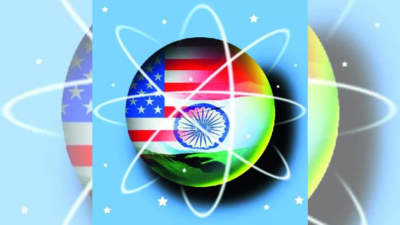- News
- India News
- 17 years after US deal, govt to clear hurdles, open nuclear power highway
Trending
17 years after US deal, govt to clear hurdles, open nuclear power highway
In a bid to boost India's nuclear sector, Finance Minister Nirmala Sitharaman announced plans to amend the nuclear liability law and introduce a nuclear energy mission. This aims to attract foreign investment and increase private sector participation. By 2033, five indigenously developed small modular reactors will be operational, with a Rs 20,000 crore allocation for research and development.
In a bid to make India's nuclear sector more attractive to foreign investors and boost private sector participation, Finance Minister Nirmala Sitharaman announced plans to amend the nuclear liability law and set up a nuclear energy mission.
The move seems to be strategically timed as the PM gears up for a US visit, where energy cooperation is likely to be discussed.
The FM said at least five indigenously developed small modular reactors (SMRs) would be made operational by 2033. For this, a Rs 20,000 crore outlay has been allocated for research and development. India has set a target of generating at least 100 gigawatts of nuclear energy by 2047. SMRs are a new generation of compact nuclear reactors that offer cost-effective and scalable energy solutions.
The Civil Liability for Nuclear Damage Act (2010) has been a big impediment to private participation in the sector due to a provision that pins liabilities on nuclear suppliers, in addition to the operator, in case of nuclear damage.
Moving to remove the biggest policy hurdle in the development of the nuclear energy sector in India and make it industry-friendly, finance minister Nirmala Sitharaman in her budget on Saturday announced that the Atomic Energy Act (1963) and the Civil Liability for Nuclear Damage Act (2010) (CLNDA) will be amended.
The aim is to develop at least 100 gigawatts (GW) of nuclear energy by 2047, make the country's nuclear sector more attractive to overseas investment and greater private sector participation.
In another significant announcement, the FM said at least five indigenously developed small modular reactors (SMRs) will be made operational by 2033 and a Rs 20,000 crore outlay has been allocated for research and development in such SMRs. Small Modular Reactors (SMRs) are a new generation of compact nuclear reactors that offer cost-effective and scalable energy solutions. The move is expected to contribute significantly to reducing the country's dependence on fossil fuels.
Almost two decades after India got a waiver by the Nuclear Suppliers Group (NSG) following the India-US nuclear deal in 2008, India may see global players in the nuclear energy sector.
The CLNDA has been the biggest impediment to private sector participation due to a provision that pins liabilities on nuclear suppliers in addition to the operator in case of nuclear damage. This provision, inserted into the law in 2010 against expert advice, has also been deemed to be contrary to India's international obligations.
"For an active partnership with the private sector towards this goal, amendments to the Atomic Energy Act and the Civil Liability for Nuclear Damage Act will be taken up," Sitharaman said.
An amendment of the Atomic Energy Act may see PSU Nuclear Power Corporation of India losing its position as the sole operator of nuclear reactors in the country, making space for private sector operators.
Given that nuclear remains a critical strategic sector, there will continue to be a strong govt presence, but aspects of the sector can be opened up for private participation.
The FM's proposal to amend the liability laws came ahead of PM Modi's proposed visit to the US and in the wake of the US last month removing restrictions on Bhabha Atomic Research Centre, Indira Gandhi Atomic Research Centre and Indian Rare Earths.
Modi described the decision to promote the private sector as "historic". "This will ensure a major contribution of civil nuclear energy in the development of the country in the coming times," he said.
Jitendra Singh, Union minister for the department of atomic energy, said, "The announcement for the Nuclear Energy Mission will be a decision that will startle the entire world..."
Anil Kakodkar, senior nuclear scientist and former chairman of Atomic Energy Commission and head of department of Atomic Energy, told TOI, "It (decision) is a strong indicator that govt has recognised the importance of nuclear energy in order to realise the aspiration of 'Viksit Bharat' with a net zero condition.
That option can't happen without a large role of nuclear energy....(but) it is very challenging as the govt needs an effective implementing mechanism."
Ramping up nuclear power is a key element in India's plan to reduce its carbon footprint and achieve net zero goal 2070 by powering industries that are difficult to decarbonise, such as steel and cement.
End of Article
FOLLOW US ON SOCIAL MEDIA











